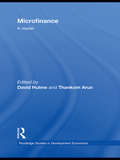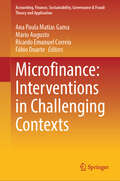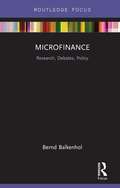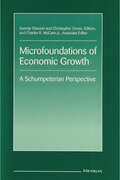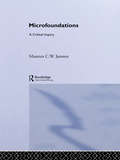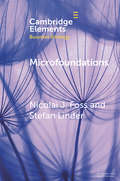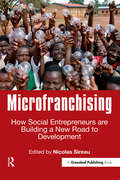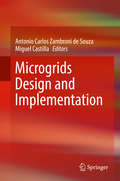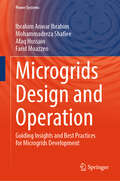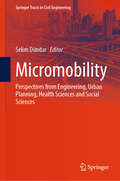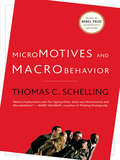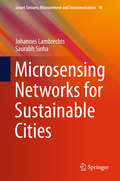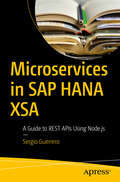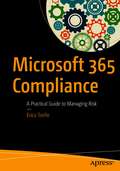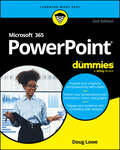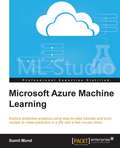- Table View
- List View
Microfinance: A Reader (Routledge Studies in Development Economics)
by David Hulme Thankom ArunMicrofinance has become an important component of development, poverty reduction and economic regeneration strategy around the world. By the early twenty first century tens of millions of people in more than 100 countries were accessing services from formal and semi-formal microfinance institutions (MFIs). Much of the initial attention on microcredit came through work on Bangladesh’s much-lauded Grameen Bank but, there are now many different ‘models’ for microfinance and many countries have substantial microfinance sectors. This timely book, written by one of the major players in the UK in development economics explores, amongst others, topics such as: microfinance and poverty reduction microfinance, gender and social development microinsurance regulating and supervising microfinance institutions. Topical and insightful, this important text examines what has become a vast global industry employing hundreds of thousands of people and attracting the attention of large numbers of governments, banks, aid agencies, non-governmental organizations and consultancy firms.
Microfinance: Interventions in Challenging Contexts (Accounting, Finance, Sustainability, Governance & Fraud: Theory and Application)
by Ana Paula Matias Gama Fábio Duarte Mário Augusto Ricardo Emanuel CorreiaThis book aims to bring new insights into the effectiveness of microfinance as a tool for boosting entrepreneurial activities that in turn enhance the capabilities of individuals living in extreme poverty across several dimensions of human development, especially in the current challenging times for both individuals and the microfinance industry. Theoretical contributions explore the interplay between classical microfinance models and entrepreneurial ecosystems as well as innovative microfinance models, such as the pass-through microlending model in the crowdfunding context. Empirical contributions shed light to the interplay between microfinance and poverty, economic development, well-being and women’s empowerment. The book also considers responses to emerging challenges, such as the COVID-19 pandemic, and promoting Sustainable Development Goals (SDG) in the microfinance market, specifically focusing on eliminating extreme poverty (SDG1), promoting shared economic growth (SDG8), and reducing the inequalities among countries (SDG10) to ensure all people achieve prosperity.
Microfinance: Perils and Prospects (Routledge Studies in Development Economics #Vol. 46)
by Jude L. FernandoMicrofinance is defined as the financial services offered to the poor for the purpose of promoting small-scale enterprises, and as such it is one of the most important topics in development studies and a burgeoning area in economics. This volume provides a much-needed historical, political and economic dimension to the current knowledge on microfinance. Collectively, the contributors chart the relationship between the prevailing popularity of microfinance and the consolidation of neoliberal economic ideology worldwide. They demonstrate how microfinance, as a market-friendly approach to development, coincides with the global trend towards diminishing the role of the state in economic development, basic healthcare, education and welfare. The articles in the volume focus on the empirical analyses of the experience of microfinance in women’s everyday lives, but rejects the connection between microfinance and women’s empowerment so often imputed in literature. This book offers regional, cultural and other explanations for variable assessments of microfinance and empowerment. It fills a huge gap in published microfinance literature and will be of great interest to postgraduates and professionals in the fields of economics, international finance and banking.
Microfinance: Research, Debates, Policy (Routledge Focus on Economics and Finance)
by Bernd BalkenholAs microfinance is increasingly being absorbed into broader debates on financial inclusion and sustainable development, there is a growing number of professionals operating in international relations and development who are often confronted with sweeping statements about the alleged benefits and risks of microfinance. This book provides a concise introduction to microfinance – the key issues, debates, research agenda and public policy relevance. Illustrated by real-life examples, the book’s sections also highlight key publications and data sources and identify gaps for future research. The book will be an invaluable resource both for development economists and for scholars in neighbouring disciplines who need to get up to speed quickly on the current debates and research in microfinance.
Microfoundations and Macroeconomics: An Austrian Perspective (Routledge Foundations Of The Market Economy Ser.)
by Steven HorwitzIn the past, Austrian economics has been seen as almost exclusively focused on microeconomics. Here,Steven Horwitz constructs a systematic presentation of what Austrian macroeconomics would look like. This original and highly accessible work will be of great value and interest to professional economists and students.
Microfoundations of Economic Growth (The International Schumpeter Society Series)
by Gunnar Eliasson Christopher Green Charles R. McCann Jr.The contributors to this volume seek further understanding of the microfoundations of economic growth. It focuses on three subjects that interested the great Austrian and Harvard economist, Joseph A. Schumpeter: innovation, technological change, and economic growth. The first part of the volume treats institutions, markets, and entrepreneurs, without which analysis of the firm makes little or no sense. The second part focuses on the firm as innovator, placing heavy emphasis on the role of knowledge formation. The subjects of innovation and knowledge formation are approached from three perspectives: theoretical; industry (case) studies; and empirical (cross section and panel data) analysis. In the third part of the book the action moves from the firm to the "macro" or economy-wide level. The volume's unique feature is combining institutions, the innovative behavior of firms, and an intuitively dynamic, macroeconomic analysis, all from a Schumpeterian perspective. It is argued that the study of micro-institutions such as firms and the evolving nature of markets are necessary ingredients to understanding macro-oriented phenomena such as economic growth. It is in this sense, then, that the book is concerned with microfoundations. Contributors are Daniele Archibugi, Spyros Arvanitis, David B. Audretsch, John R. Baldwin, Gerard Ballot, Pontus Braunerhjelm, Dagobert L. Brito, Uwe Cantner, Bo Carlsson, Robert W. Clower, Richard Day, Rinaldo Evangelista, Jan Glete, Horst Hanusch, Heinz Hollenstein, Michael D. Intrilgator, George Johnson, Joanne Johnson, Aija Leiponen, Staffan Laestadius, Richard N. Langlois, Frank M. Machovec, Maureen McKelvey, Valentina Meiciani, Douglass C. North, Giulio Perani, Andreas Pyka, Fabio Rapiti, Roberto Simonetti, Frank Stafford, Paula E. Stephan, Erol Taymaz, Clas Wihlborg, Erica R. Worth, and S. Y. Wu. Gunnar K. Eliasson is Professor of Industrial Economics, Royal Technical Institute (KTH), Stockholm. Christopher Green is Professor of Economics, McGill University. Charles R. McCann, Jr., is Research Associate, Department of Economics, University of Pittsburgh.
Microfoundations of Evolutionary Economics (Evolutionary Economics and Social Complexity Science #15)
by Kazuhisa Taniguchi Yoshinori Shiozawa Masashi MoriokaThis book provides for the first time the microfoundations of evolutionary economics, enabling the reader to grasp a new framework for economic analysis that is compatible with evolutionary processes. Any independent approach to economics must include a value theory (or price theory) and price and quantity adjustment processes. Evolutionary economics has rightly and successfully concentrated its efforts on explaining evolutionary processes in technology and institutions. However, it does not have its own value theory and is not capable of explaining the workings of everyday economics processes, in which any evolutionary process would take place.Our point of departure is the addition of myopic agents with severely limited rational and forecasting capacities (in stark contrast to mainstream economics). We show how myopic agents, in a complex world, can produce a stable price system and demonstrate how they can adjust their production to changing demand flows. Agents behave without any knowledge of the overall process, and they generate a stable economy as large as the global network of exchanges. This is the true “miracle” of the market mechanism. In contrast to mainstream general equilibrium theory, this miracle can be explained without the need for an auctioneer or infinitely rational agents. Thanks to this book, evolutionary economics can now claim to be an independent approach to economics that can completely replace mainstream neoclassical economics.
Microfoundations: A Critical Inquiry
by Maarten JanssenAll economists are familiar with the division of the subject into microeconomics and macroeconomics. However, few economists are able to give an accurate account of what distinguishes micro and macro. The increasing interest in the `microfoundations of macroeconomics' has typically attracted those who feel that economics is about the rational behaviour of individuals and who regard macro propositions as a consequence of the intentions of individuals. As a result, `microfoundations' have come to be synonymous with theories of individual behaviour. However, Maarten Janssen argues that it is microeconomics' concern with the functioning of markets that underlies theories of microfoundations. This claim is substantiated by an analysis of the aggregation problem, of the foundations of equilibrium theories, of the rational expectations hypothesis, and of a model from the New Keynesian literature.
Microfoundations: Nature, Debate, and Promise (Elements in Business Strategy)
by Nicolai J. Foss Stefan Linder“Microfoundations” has become prominent in the discourse of management scholars. But what is it and how does it matter? This Element provides a characterization of microfoundations based on classical work on the methodology of social science and documents and discusses its manifestations in management research over the last one and a half decades. It also covers the relation of microfoundations to multilevel research; criticisms of microfoundations; and empirical research strategies for microfoundations.
Microfranchising: How Social Entrepreneurs are Building a New Road to Development
by Nicolas SireauIt is increasingly clear that fifty years of international development have done little to reduce poverty in Africa. Indeed, more and more academics and practitioners are highlighting the detrimental effect of traditional development – as carried out by international agencies and NGOs – which often leads to dependency, inefficiency, waste and poor governance. Yet there is a new movement that is surging ahead in its attempt to reduce poverty and generate wealth in Africa: microfranchising. Set up by pioneering organizations such as VisionSpring and HealthStore, microfranchising is based on one of the most successful market-based models in Western economies: franchising. From McDonald's to Coca-Cola, franchising has proven itself to be an effective and replicable way of scaling up a business rapidly in the Western context. It is only recently that members of the growing body of social entrepreneurs have turned to the franchise model as one of the responses to Africa's endemic economic stagnation. And the results have been inspiring: instead of the dependency generated by traditional charity development projects, these new social capitalists have generated enterprise and self-sustainability in the most challenging environments of rural Africa. This long-needed book looks at the growth in microfranchising as a tool to generate wealth among poor communities in Africa. The book traces the evolution of the concept of microfranchising, from its foundation in Western models to its implementation in African countries today. It provides practical steps from the world's leading experts on how to set up a microfranchise, from recruiting franchisees, to building a brand and a supply chain. It gives case studies of successful microfranchises, told by the enterprises themselves. It continues with a theoretical analysis of the place of microfranchising within global social entrepreneurship. It ends with a look at the future for microfranchising, with recommendations for development. Edited by the former CEO of SolarAid, which created the Sunny Money microfranchise, the book provides a ground-breaking set of case studies and analysis of microfranchising for development. It brings together academics and practitioners to provide context, analysis and practical advice. Indeed, it provides the theory, the practical advice and the case studies to guide any entrepreneur, NGO, business or government interested in setting up their own microfranchise scheme.
Microgrids Design and Implementation
by Antonio Carlos Zambroni de Souza Miguel CastillaThis book addresses the emerging trend of smart grids in power systems. It discusses the advent of smart grids and selected technical implications; further, by combining the perspectives of researchers from Europe and South America, the book captures the status quo of and approaches to smart grids in a wide range of countries. It describes the basic concepts, enabling readers to understand the theoretical aspects behind smart grid formation, while also examining current challenges and philosophical discussions. Like the industrial revolution and the birth of the Internet, smart grids are certain to change the way people use electricity. In this regard, a new term – the “prosumer” – is used to describe consumers who may sometimes also be energy producers. This is particularly appealing if we bear in mind that most of the distributed power generation in smart grids does not involve carbon emissions. At first glance, the option of generating their own power could move consumers to leave their current energy provider. Yet the authors argue that doing so is not a wise choice: utilities will play a central role in this new scenario and should not be ignored.
Microgrids Design and Operation: Guiding Insights and Best Practices for Microgrids Development (Power Systems)
by Ibrahim Anwar Ibrahim Mohammadreza Shafiee Afaq Hussain Farid MoazzenThis book delves into the evolving landscape of microgrids, offering a comprehensive guide on their design, operation, and integration within modern electrical networks. The subject of this book is microgrids, which are pivotal in the transition toward decentralised, decarbonised, and digitalised energy systems. The book is structured around several practical use cases, detailing the methods and results that will be of particular interest to readers, such as optimisation of power flow, integration of distributed energy resources (DERs), and advanced energy management systems. It features an array of illustrations, tables, and diagrams that enhance the reader's understanding of complex concepts, along with a didactic approach that includes step-by-step guides and case studies of 30 microgrid projects from around the world. Readers will benefit from detailed insights into the economic, technical, and social aspects of microgrids, including their role in enhancing grid resilience, improving energy efficiency, and supporting renewable integration. The book also addresses the latest technological advancements, such as digital twins and machine learning applications, that are shaping the future of microgrid design and operation. It serves as a practical manual, providing frameworks and methodologies that can be applied in real-world scenarios to optimise microgrid performance. The unique combination of theoretical knowledge and practical experience makes this book a valuable resource for researchers, engineers, policymakers, and practitioners in the energy sector.
Microgrids and Virtual Power Plants (Power Systems)
by Farhad Shahnia Josep M. GuerreroThis book highlights recent research advancements in the area of microgrids and virtual power plants. Microgrids and virtual power plants are the future of power generation and delivery systems, and there has been significant research interest in this area over the past decade. The key emphasis of this book is on the various modelling, analysis, and management aspects of microgrids and virtual power networks. Interesting topics such as their planning, operation, and technology accommodation are presented in detail. The chapters in the book discuss existing and new modelling approaches, control and management methods, as well as their structures, planning, monitoring, protection, and coordination. This book introduces and covers these topics in a comprehensive and coherent way for professionals and researchers.
Micromax: Scaling the Largest Indian Mobile Handset Company
by Ranjay Gulati Rachna Tahilyani Alicia DesantolaIt is January 2014 and Rahul Sharma, cofounder of Micromax Informatics (Micromax), the largest Indian mobile handset company, is preparing for an emergency conference call with his private equity investors. In the last six years, Micromax had grown its annual product revenues from $54M to over $1B. Unfortunately, it was difficult for the founding team to keep up with Micromax's rapid growth, triggering a series of missteps in 2010 that brought the company close to catastrophe. In response, investors had convinced Sharma and his cofounders to hire their first outside CEO, Deepak Mehrotra, and several senior professionals. With the founders working alongside the new "professionals," frequent overlaps and sometimes run-ins occurred. Now, both Mehrotra and the head of their smartphone division had resigned. Sharma evaluates their options: Would the founders need to reconsider their involvement in the company they created? Or was there still a middle ground where both founders and professionals could coexist in the business?
Micromax: Scaling the Largest Indian Mobile Handset Company
by Ranjay Gulati Rachna Tahilyani Alicia DesantolaIt is January 2014 and Rahul Sharma, cofounder of Micromax Informatics (Micromax), the largest Indian mobile handset company, is preparing for an emergency conference call with his private equity investors. In the last six years, Micromax had grown its annual product revenues from $54M to over $1B. Unfortunately, it was difficult for the founding team to keep up with Micromax's rapid growth, triggering a series of missteps in 2010 that brought the company close to catastrophe. In response, investors had convinced Sharma and his cofounders to hire their first outside CEO, Deepak Mehrotra, and several senior professionals. With the founders working alongside the new "professionals," frequent overlaps and sometimes run-ins occurred. Now, both Mehrotra and the head of their smartphone division had resigned. Sharma evaluates their options: Would the founders need to reconsider their involvement in the company they created? Or was there still a middle ground where both founders and professionals could coexist in the business?
Micromobility: Perspectives from Engineering, Urban Planning, Health Sciences and Social Sciences (Springer Tracts in Civil Engineering)
by Selim DündarThis book provides a comprehensive overview on micromobility, which is a mode of transportation that has become particularly popular among young people in recent years, due to the impact of the COVID-19 pandemic, and supports public transport for short distances. It includes contributions by an interdisciplinary pool of authors from civil engineering, urban and regional planning, law, social sciences, physiotherapy, and rehabilitation. It demonstrates that micromobility is a developing mode of transportation and represents a service that needs to be integrated into the transportation system. The book addresses micromobility from various perspectives, making it a reference tool for researchers, transportation planners, operators, decision-makers, and policy-makers. A special focus is put on the effects of micromobility on health, the business models, and the legal status of micromobility systems, reflecting perspectives from both health sciences and social sciences.
Micromotives and Macrobehavior
by Thomas C. SchellingBefore Freakonomics and The Tipping Point there was this classic by the 2005 Nobel Laureate in Economics. "Schelling here offers an early analysis of 'tipping' in social situations involving a large number of individuals."--official citation for the 2005 Nobel Prize Micromotives and Macrobehavior was originally published over twenty-five years ago, yet the stories it tells feel just as fresh today. And the subject of these stories--how small and seemingly meaningless decisions and actions by individuals often lead to significant unintended consequences for a large group--is more important than ever. In one famous example, Thomas C. Schelling shows that a slight-but-not-malicious preference to have neighbors of the same race eventually leads to completely segregated populations. The updated edition of this landmark book contains a new preface and the author's Nobel Prize acceptance speech.
Micropolitics in the Multinational Corporation
by Christoph Dörrenbächer Mike Geppert Becker-Ritterspach, Florian A. A. and Blazejewski, Susanne and Dörrenbächer, Christoph and Geppert, Mike Becker-Ritterspach, Florian A. A. Susanne BlazejewskiOver the past decade, politics perspectives in international business have moved into the mainstream repertoire of research, theory development and teaching about the organisational behaviour of multinational corporations (MNCs). Politics perspectives contribute substantially to understanding the behaviour in and of MNCs in their different contexts and environments but so far these burgeoning perspectives have not been systematically and comprehensively reviewed. This book offers the first detailed overview of the theoretical foundations, methodologies and empirical applications of politics perspectives in MNCs. A group of international authors discuss twelve seminal contributions to the study of politics, power and conflict in MNCs, followed by a summary and synthesis of the literature into a comprehensive analytical framework. The book closes with a discussion of future directions in the field. This is a thorough introduction to political behaviour in MNCs written for scholars and graduate students in the fields of organisation studies and international business.
Microsensing Networks for Sustainable Cities
by Saurabh Sinha Johannes LambrechtsThis book explores the microsensing technologies and systems now available to monitor the quality of air and water within the urban environment and examines their role in the creation of sustainable cities against the background of the challenges posed by rapid urbanization. The opening section addresses the theoretical and conceptual background of microsensing networks. The coverage includes detailed description of microsensors, supported by design-specific equations, and clear explanation of the ways in which devices that harvest energy from ambient sources can detect and quantify pollution. The practical application of such systems in addressing environmental impacts within cities and in sustainable urban planning is then discussed with the aid of case studies in developing countries. The book will be of interest to all who wish to understand the benefits of microsensing networks in promoting sustainable cities through better delivery of information on health hazards and improved provision of data to environmental agencies and regulatory bodies in order to assist in monitoring, decision-making, and regulatory enforcement.
Microservices in SAP HANA XSA: A Guide to REST APIs Using Node.js
by Sergio GuerreroBuild enterprise-grade microservices in the SAP HANA Advanced Model (XSA). This book explains building scalable APIs in XSA and the benefits of building microservices with SAP HANA XSA.This book covers the cloud foundry (CF) architecture and how SAP HANA XSA follows the model. It begins with the details of the different architectural layers of applications hosted in XSA (specifically, microservices). Everything you need to know is presented, including analyzing requests, modularization, database ingestion, building JSON responses, and scaling your microservices. You will learn to use developmental tools such as the SAP WEB IDE, POSTMAN, and the SAP HANA Cockpit for XSA, including debugging examples on SAP HANA XSA with code snippets showing how microservices can be developed, debugged, scaled, and deployed on SAP HANA XSA. Microservices are divided into security and authentication, request handling, modularization of Node.js, and interaction with the SAP HANA database containers and response formatting. An end-to-end scenario is presented of a Node.js REST API that uses HTTP methods, concluding with deploying an SAP HANA XSA project to a production environment. This book is simple enough to help you implement a Node.js module in order to understand the development of microservices, and complex enough for architects to design their next business-ready solution integrating UAA security, application modularization, and an end-to-end REST API on SAP HANA XSA.What You Will LearnKnow the definition and architecture of cloud foundry and its application on SAP HANA XSAUnderstand REST principles and different HTTP methodsExplore microservices (Node.js) developmentDatabase interaction from Node (executing SQL statements and stored procedures)Who This Book Is ForArchitects designing business-ready solutions that integrate UAA security, application modularization, and an end-to-end REST API on SAP HANA XSA
Microsoft 365 Compliance: A Practical Guide to Managing Risk
by Erica ToelleUse the information presented in this book to implement an end-to-end compliance program in your organization using Microsoft 365 tools. You will learn about the solutions available in the Microsoft 365 Compliance Center, including best practices and common pitfalls. IT professionals will benefit from the author’s approach of introducing each topic within a practical business context and scenarios behind the “whys” of compliance. Compliance managers will understand how to implement their requirements in Microsoft 365. Compliance and risk management is often a board- or CEO-level issue. The risks of hefty fines and bad PR from non-compliance are severe. IT is usually responsible for implementing compliance controls and for working with compliance and legal officers to manage the day-to-day risk in an organization. After reading Microsoft 365 Compliance, you will be prepared to have a well-informed conversation with your compliance and legal officers to determine how to work together to identify specific compliance requirements for your organization. You will be able to implement those requirements yourself using Microsoft 365 features. Compliance and legal officers will understand how to communicate their technical requirements to IT. Author Erica Toelle helps you build a solid compliance foundation by teaching you about topics such as information protection, retention, records management, eDiscovery, auditing, compliance with common regulations, managing insider risks, supervising communications, data loss prevention, protecting sensitive information, and using machine learning to reduce compliance costs. What You Will Learn Understand typical business scenarios and requirements for a Microsoft 365 compliance program Fulfill these compliance scenarios and requirements using out of the box Microsoft 365 solutions and functionality Ensure that your Microsoft 365 implementation meets standard compliance regulations, such as GDPR and ISO/IEC 27001:2013 Enlist best practices and things to know when implementing Microsoft 365 solutions Comprehend required Microsoft licensing and how to implement a least permissions model for each compliance solution Explore what you can accomplish using the compliance center user interface, without custom scripting or code This book is for IT professionals, security managers, compliance officers, risk managers, internal audit, records managers, CIOs, and anyone who would like to learn more about Microsoft 365 compliance. ·
Microsoft 365 PowerPoint For Dummies
by Doug LowePresent like a pro, with the top-selling PowerPoint book on the market Since 1999, PowerPoint For Dummies has been giving readers a jargon-free way to compose compelling presentations. This update covers the latest release of Office and Office 365. Learn the basics of creating a slide deck in PowerPoint, then discover the dynamic features you can use to give your slides a bit of pizazz. Import data from other applications, collaborate in the cloud, and incorporate charts, graphics, and videos into your presentations. Plus, learn how to use Microsoft's new Copilot AI tool—integrated right into the application. Consider this book your first step to making a splash with PowerPoint! Create your first PowerPoint slide deck and add presentation notes Improve the design of your slides with templates and best-practice tips Add animations, change your font style, and insert images and drawings Share your presentation with audiences in a virtual setting New and not-so-new PowerPoint users who need a guide to the basics of building a successful presentation will love this up-to-date, beginner-friendly book.
Microsoft Azure Machine Learning
by Sumit MundThe book is intended for those who want to learn how to use Azure Machine Learning. Perhaps you already know a bit about Machine Learning, but have never used ML Studio in Azure; or perhaps you are an absolute newbie. In either case, this book will get you up-and-running quickly.
Microsoft Corp.: The Introduction of Microsoft Works
by Thomas J. KosnikMicrosoft must decide how to design a new software product for global markets, identify the timing for entry into different countries, and position the product around the world.
